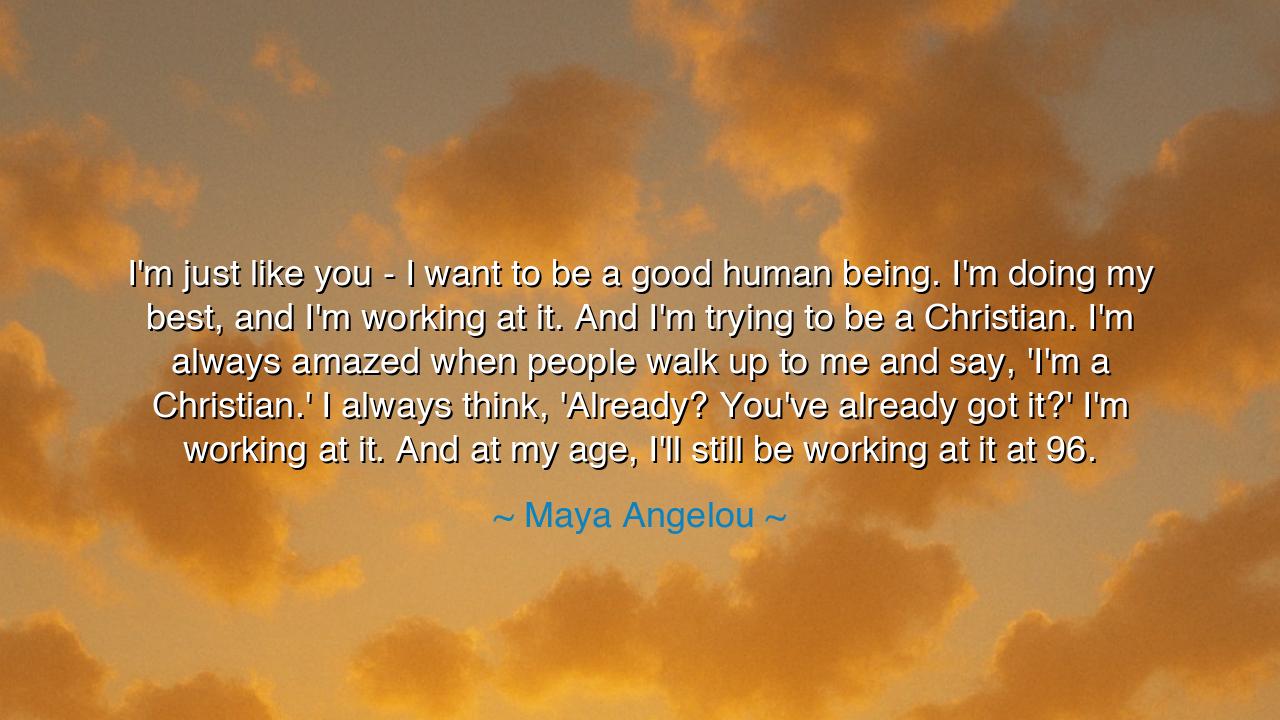
I'm just like you - I want to be a good human being. I'm doing my
I'm just like you - I want to be a good human being. I'm doing my best, and I'm working at it. And I'm trying to be a Christian. I'm always amazed when people walk up to me and say, 'I'm a Christian.' I always think, 'Already? You've already got it?' I'm working at it. And at my age, I'll still be working at it at 96.






In the grand tapestry of life, woven with the threads of our triumphs and failures, there lies a fundamental truth that the wise have long known: the journey to becoming a truly good human being is a lifelong endeavor. Maya Angelou, in her simple yet profound words, calls attention to this eternal truth: “I’m just like you—I want to be a good human being. I’m doing my best, and I’m working at it. And I’m trying to be a Christian.” She speaks not from a place of perfection, but from the depths of humility and honesty, acknowledging that the pursuit of virtue is not a destination, but a path that winds, that tests, and that challenges us at every turn. Her words stir us to remember that no one is born perfected, but rather, it is through effort, struggle, and the willingness to improve that we shape our character.
The ancients spoke often of the pursuit of goodness, of becoming a person of integrity, virtue, and grace. They understood that this was not a task for the young alone, nor one that could be achieved in the fullness of time. To be a true human, to live with honor and purpose, is to constantly strive towards that ideal, knowing that perfection is not attainable. Even the greatest philosophers of the ancient world, such as Socrates and Aristotle, spoke of the constant striving for excellence as the true essence of life. Socrates famously claimed, “The unexamined life is not worth living,” underscoring the importance of self-reflection and self-improvement. Similarly, Aristotle believed that virtue was achieved not by a singular act but by habits of goodness, cultivated over a lifetime of effort.
In Maya Angelou’s humility, she embodies the timeless spirit of these ancient teachings. “I’m working at it,” she says, and in these words is the essence of a life well-lived. To be a Christian, or to follow any path of virtue, is not a proclamation of arrival, but an ongoing commitment to growth. Angelou expresses that she is not content to rest upon the laurels of her identity or achievements; rather, she humbly acknowledges that every day is an opportunity to learn and evolve. This is a lesson passed down through the ages, from the wisdom of ancient sages to modern voices like hers. The struggle to become a better person is not a fleeting task but a lifelong journey—one that must be undertaken with sincerity and dedication.
Think, too, of Confucius, who, even in his advanced years, continued to seek wisdom and to cultivate virtue. He famously stated, “I am not one who was born wise; I am one who is constantly learning.” Even in the twilight years of life, when most might rest, Confucius continued to seek knowledge, to refine his understanding, and to guide others with the wisdom he had earned. In this, he mirrored the spirit of Angelou’s words. To strive for goodness and to work towards being a better human is not a pursuit that ends with age or accomplishment; it is a journey that endures until the final breath.
In Maya Angelou’s reflection, we see an important lesson about self-awareness and humility. True greatness is not in declaring oneself a finished product but in the humble recognition that there is always more to learn, always more to grow. It is a recognition that our faults, our shortcomings, and our imperfections are part of the human experience, and rather than turning away from them, we must meet them with courage, self-compassion, and a steadfast commitment to improve. The journey to becoming a good human being—whether in the eyes of a faith, a community, or one’s own conscience—is one that spans a lifetime.
The lesson here is clear: do not be content with declaring your moral or spiritual arrival. To say, "I am a Christian," or to claim any virtue, is not the end of the journey but merely a step along the way. Maya Angelou reminds us that there is no final destination in the pursuit of goodness, but rather, it is the ongoing work—the effort to grow, to improve, to become better—that defines the true human spirit. No matter your age, no matter your achievements, you are always in the process of becoming, always striving to align your actions with your ideals.
Practical steps then, for all who hear this teaching: examine your life, and commit to a continual process of growth. Do not allow complacency to take root in your heart. Cultivate habits of goodness each day—whether through acts of kindness, self-reflection, or the pursuit of knowledge. Understand that perfection is not the goal, but rather the striving toward something greater. And as you walk the path, remember the wisdom of Maya Angelou: even at 96, the work continues. You are always a work in progress, and in that lies the beauty of being human.






AAdministratorAdministrator
Welcome, honored guests. Please leave a comment, we will respond soon